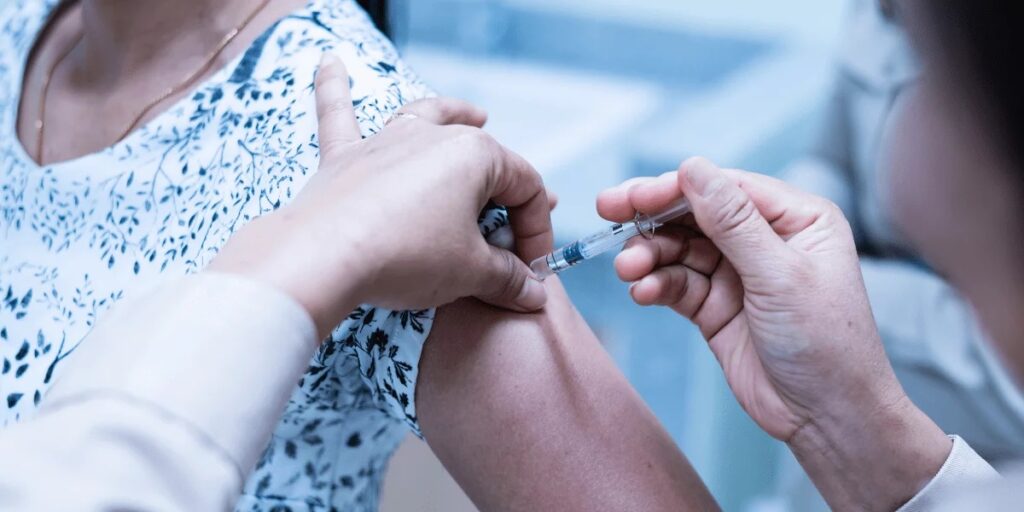- Home
- Flu Vaccination Service
Flu Vaccination Service

Flu Vaccination Service
The flu is a common occurrence throughout the year, but the winter months poses the greatest risk for those who are more susceptible. The vaccination process against the common flu occurs throughout September and October. Our Flu Vaccination Service provides the flu vaccine, administered by our specially trained Pharmacists, to help prevent you from catching flu. The Flu Vaccination Service is suitable for most adults. If you are interested in receiving the service, our pharmacists will take you through a short series of questions to ensure that it is suitable before giving the vaccination. Lifelong immunity to the influenza virus is virtually impossible to achieve and therefore an annual vaccination is required to provide protection from the disease.

Who is affected by the winter Flu?
We offer the flu vaccine every year to help protect adults, the elderly, children, and those considered “high-risk” for flu and its complications. Several millions of people have been saved from catching the flu thanks to the efforts of community pharmacies like ourselves in the last few years. Flu is known to be more severe in certain groups, for example:
- anyone aged 50 and over
- pregnant women
- children and adults with an underlying health condition or weakened immune system (such as long-term heart, auto immune or respiratory disease)
The flu vaccination service is a vital service to anyone in these high-risk groups and is more likely to develop potentially severe complications of flu, such as the secondary bacterial infection pneumonia that can affect the lungs, so it’s recommended that they have a flu vaccine every year during flu season to help protect them.
The flu vaccine is available at your doctor’s office but given their busy schedule may have you on a longer waiting list, we can help take off any additional stress involved regarding scheduling your flu vaccine – just visit our office and you’ll be taken care off. If you would like more information on our flu vaccination service before your visit, please don’t hesitate to contact us. For more information on the flu vaccination visit this link
(http://www.floridahealth.gov/programs-and-services/prevention/flu-prevention/flu-facts.html)
Which groups are eligible for the free flu vaccination service in 2021?
Due to the Coronavirus outbreak and subsequent lockdowns, there has been a recently revision to the ‘at-risk’ category for 2021 and into 2022. For more information on the importance of flu vaccinations during the COVID-19 pandemic, you can read more on from this link (https://www.cdc.gov/flu/prevent/vaccinations.htm) on the subject.
The newly updated list of those eligible for a flu vaccination is as follows:
- All persons aged 6months and older are recommended for annual flu vaccination, with rare exceptions.
- Different flu shots are approved for people of different ages. Everyone should get a vaccine that’s appropriate for their age.
- Pregnant women, with certain chronic health conditions can get a flu shot but would need to talk to their doctor and obtain an approval from their doctor for specific kind of flu vaccine.
High Risk Group Includes people with certain medical conditions such as:
- Chronic respiratory diseases, such as severe asthma, chronic obstructive pulmonary disease (COPD) or bronchitis
- Chronic heart and kidney disease, such as heart failure kidney disease at stage three, four or five
- Chronic liver disease
- Chronic neurological disease, such as Parkinson’s disease, motor neuron disease, learning disability
- Diabetes
- Immunosuppression, a weakened immune system due to disease (such as HIV/AIDS) or treatment (such as cancer treatment)
- Asplenia or splenic dysfunction
- Those who are morbidly obese
People who needs special consideration before getting the flu vaccine:
- People with severe, life-threatening allergies to any ingredient in a flu vaccine (other than egg proteins) should not get that vaccine. This might include gelatin, antibiotics, or other ingredients. See Special Considerations Regarding Egg Allergy for more information about egg allergies and flu vaccine.
- People who have had a severe allergic reaction to a dose of influenza vaccine should not get that flu vaccine again and might not be able to receive other influenza vaccines. If you have had a severe allergic reaction to an influenza vaccine in the past, it is important to talk with your health care provider to help determine whether vaccination is appropriate for you. People who should talk to their health care provider before getting a flus shot: If you have one of the following conditions, talk with your health care provider. He or she can help decide whether vaccination is right for you, and select the best vaccine for your situation:
- If you have an allergy to eggs or any of the ingredients in the vaccine. Talk to your doctor about your allergy. See Special Considerations Regarding Egg Allergy for more information about egg allergies and flu vaccine.
- If you ever had Guillain-Barré Syndrome (a severe paralyzing illness, also called GBS). Some people with a history of GBS should not get a flu vaccine. Talk to your doctor about your GBS history.
- If you had a severe allergic reaction to a previous dose of any other flu vaccine, talk to your health care provider.
- If you are not feeling well, talk to your doctor about your symptoms.
People who should talk to their health care provider before getting a flu shot:
- If you have one of the following conditions, talk with your health care provider. He or she can help decide whether vaccination is right for you, and select the best vaccine for your situation:
- If you have an allergy to eggs or any of the ingredients in the vaccine. Talk to your doctor about your allergy. See Special Considerations Regarding Egg Allergy for more information about egg allergies and flu vaccine.
- If you ever had Guillain-Barré Syndrome (a severe paralyzing illness, also called GBS). Some people with a history of GBS should not get a flu vaccine. Talk to your doctor about your GBS history.
- If you had a severe allergic reaction to a previous dose of any other flu vaccine, talk to your health care provider.
- If you are not feeling well, talk to your doctor about your symptoms.
Health tips for those who have received the flu vaccination

After getting vaccinated, good health practices also act as a line of defense against the winter flu.
- Take everyday preventive actions that are recommended to reduce the spread of flu.
- Avoid close contact with people who are sick. o If you are sick, limit contact with others as much as possible to keep from infecting them.
- Cover coughs and sneezes.
- Cover your nose and mouth with a tissue when you cough or sneeze. Throw the tissue in the trash after you use it.
- Wash your hands often with soap and water. If soap and water are not available, use an alcohol-based hand rub.
- Avoid touching your eyes, nose, and mouth. Germs spread this way.
- Clean and disinfect surfaces and objects that may be contaminated with viruses that cause flu.
- For flu, CDC recommends that people stay home for at least 24 hours after their fever is gone except to get medical care or other necessities. Fever should be gone without the need to use a fever-reducing medicine. Note that the stay-at-home guidance for COVID-19 may be different. Learn about some of the similarities and differences between flu and COVID-19.
- In the context of the COVID-19 pandemic, local governments or public health departments may recommend additional precautions be taken in your community. Follow those instructions.
